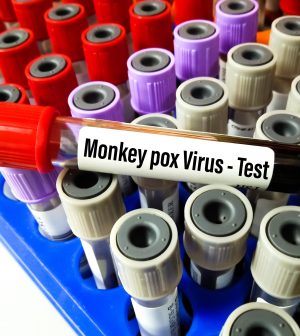- Could Artificial Sweeteners Be Aging the Brain Faster?
- Techniques for Soothing Your Nervous System
- Does the Water in Your House Smell Funny? Here’s Why
- Can a Daily Dose of Apple Cider Vinegar Actually Aid Weight Loss?
- 6 Health Beverages That Can Actually Spike Your Blood Sugar
- Treatment Options for Social Anxiety Disorder
- Understanding the Connection Between Anxiety and Depression
- How Daily Prunes Can Influence Cholesterol and Inflammation
- When to Take B12 for Better Absorption and Energy
- Epsom Salts: Health Benefits and Uses
9 Monkeypox Cases Confirmed in United States

Nine cases of monkeypox had been confirmed in seven states as of Wednesday, and there are likely to be more cases as a worldwide outbreak continues, U.S. health officials say.
The nine cases of the disease, which does not occur naturally in the United States, were identified in Massachusetts, Florida, Utah, Washington, California, Virginia and New York, according to the U.S. Centers for Disease Control and Prevention, CNN reported.
While the case in Virginia involves a woman, most of the cases “are within gay [and] bisexual men and other men who have sex with men,” CDC Director Dr. Rochelle Walensky said on Thursday.
The approach to the situation needs to be “guided by science, not by stigma,” she emphasized, CNN reported.
“While some groups may have a greater chance of exposure right now, infectious diseases do not care about state or international borders. They’re not contained within social networks, and the risk of exposure is not limited to any one particular group,” Walensky explained.
“We shouldn’t be surprised to see more cases,” she noted.
The CDC is working to learn how each of the nine patients contracted the virus. Walensky said some have a recent history of international travel to places with active monkeypox outbreaks, but others do not, CNN reported.
The disease is not thought to be easily transmitted and typically people pick up monkeypox from an infected animal. When human-to-human transmission occurs it is usually through close direct contact, such as contact with lesions on the skin or the inhalation of large respiratory droplets.
The CDC has told doctors and the public to watch for symptoms of monkeypox, which can include fever, headache, muscle aches, swollen lymph nodes and lesions or pustules and a rash on the body, including the palms of the hands and the soles of the feet.
“We shouldn’t be surprised to see more cases reported in the U.S. in the upcoming days. It’s actually a sign that Americans are remaining vigilant, and health care providers and public health workers are doing their job,” said Dr. Raj Panjabi, White House senior director for health security and biodefense, CNN reported.
There are vaccines for monkeypox and they’ll be sent where needed, according to Walensky.
“One of these vaccines, with the trade name of Jynneos, is approved for the prevention of monkeypox disease in adults 18 years of age and older,” Walensky said. “CDC has mechanisms in place to move these products around the country so that they can be used for prevention or treatment for people who may benefit, wherever they may be.
“The U.S. has the resources we need to help us respond to monkeypox in this country right now. We’ve been preparing for this type of outbreak for decades,” she said.
More information:
Learn more about monkeypox at the. U.S. Centers for Disease Control and Prevention.
SOURCE: CNN
Source: HealthDay
Copyright © 2026 HealthDay. All rights reserved.










